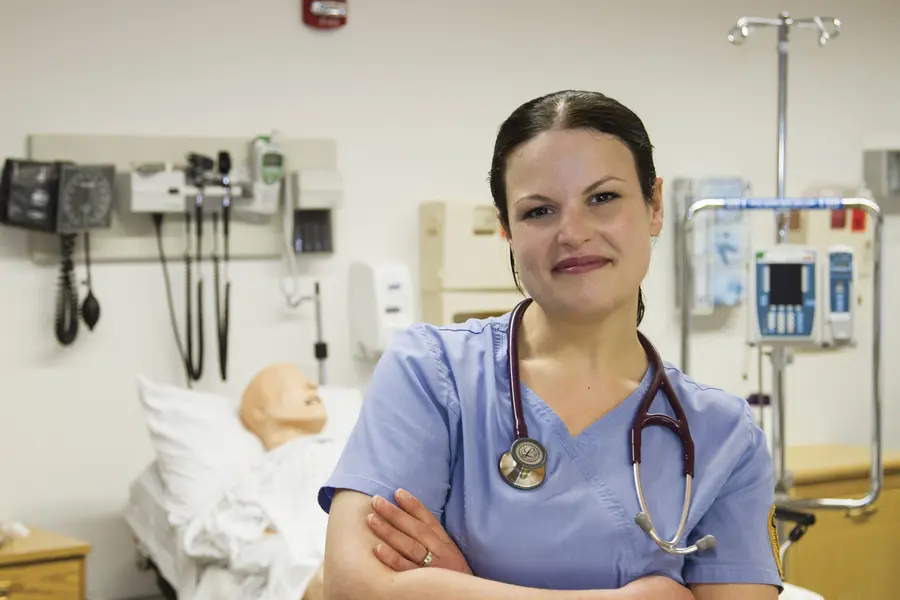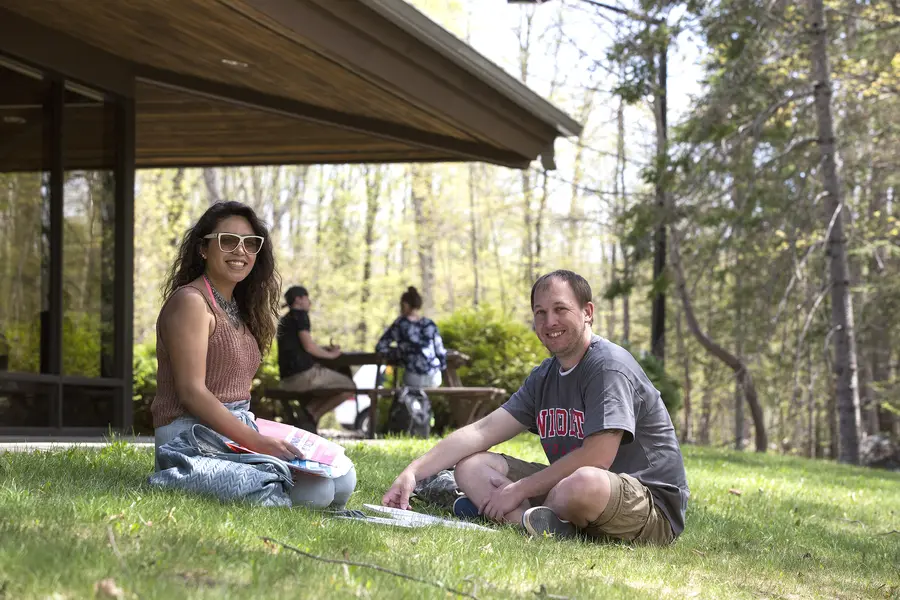Substance Use Disorder Counselor (SUDC)
The program is designed for individuals interested in working with addiction issues. Through mostly online, minimal classroom/laboratory, and field experience, you will develop skills in counseling, diagnosis of addiction issues, treatment planning, group facilitation, and crisis management. Students will also learn how to respect client’s rights, understand the complexity of addiction illnesses, and adhere to ethical guidelines. The degree will prepare you for entry-level work in facilities such as clinics, hospitals, community residential facilities, and various community and social services agencies.
After completion of department approved coursework, students are eligible to apply for certification in Wisconsin to become a Substance Abuse Counselors – In Training (SAC-IT).
Students must successfully pass a background check and complete clinical requirements. For more information, please connect with a Success Coach.
Program Outline
| Course # | Course Title | Credits |
|---|---|---|
| 1055020100 | Understanding Substance UseDescriptionExplore the bio-psych social dynamics of substance use. Examine treatment approaches, models, and screening criteria. Examine substances of abuse, history of SUDs, and their impact on the individual and society. |
3.00 |
| 1055020600 | Introduction Interviewing and Counseling SkillsDescriptionDescription Analyze foundational skills in the counseling relationship. Analyze the stages of the helping processes and the roles professionals play in the processes. Analyze the importance of establishing therapeutic relationships. Apply basic counseling techniques. Apply interviewing and counseling skills through mock counseling sessions and personal experience reflections. Examine issues of boundaries and ethics. |
3.00 |
| 1080619800 | Human BiologyDescriptionThis is an introductory course that emphasizes the structure of the human body and the functional interrelationships of the body's systems. Consideration is given to the human body and disease, human genetics, human ecology, and the role that humans play in the environment. The course consists of 3 hours of lecture and 2 hours of lab per week. Note: This course does not meet requirements for or substitute for General Anatomy and Physiology. |
4.00 |
| 1080919800 | Introduction to PsychologyDescriptionThis science of psychology course is a survey of multiple aspects of behavior and mental processes. It provides an overview of topics such as research methods, theoretical perspectives, learning, cognition, memory, motivation, emotions, personality, abnormal psychology, physiological factors, social influences, and development. |
3.00 |
| 1080119500 | Written CommunicationDescriptionDevelops writing skills which include prewriting, drafting, revising, and editing. A variety of writing assignments is designed to help the learner analyze audience and purpose, research and organize ideas, and format and design documents based on subject matter and content. Also develops critical reading and thinking skills through the analysis of a variety of written documents. |
3.00 |
| Course # | Course Title | Credits |
|---|---|---|
| 1055020200 | Foundations of Case ManagementDescriptionIntroduction to case management techniques and processes. Incorporates intake assessment techniques, service planning techniques, referral processes, coordination of care, and discharge processes determined by a multidisciplinary team approach. Includes client self-determination and autonomy. Incorporates clinical documentation requirements and processes. Prerequisite: 1055020600 Introduction to Interview and Counsel (C or better). |
3.00 |
| 1055020400 | Group FacilitationDescriptionAn introduction to theory and practice of group dynamics and processes. Includes ethical considerations, effective group leadership, and stages of group development. Also includes demonstration of group facilitation skills, clinical documentation, co-facilitation strategies, reflective practitioner techniques, and group formation. Prerequisite: 1055020600 Introduction to Interview and Counsel (C or better). |
3.00 |
| 1055020700 | PsychopharmacologyDescriptionOverview of psychopharmacology including drug categorization history, drug categorization, and drug classification. Includes analysis of neurophysiology of the brain and endocrine system, effects of substances on the body, analysis of delivery systems, and analysis of medical aspects of SUDs. Also includes etiology of addiction, psychopharmacological aspects of withdrawal management, analysis of medications used to treat SUDs and mental health disorders, and SUD medical impacts on the body. Prerequisite: 1055020100 Understanding Substance Use (C or better). |
3.00 |
| 1055020900 | Family SystemsDescriptionProvides a broad understanding of family systems theory and practice relevant to the human services field. Focus is on evaluating the communication and interaction patterns and applying interventions and strategies. Prerequisite: 1055020100 Understanding Substance Use (C or better). |
3.00 |
| 1055021000 | Boundaries and Ethics for the Helping ProfessionDescriptionEvaluate the ethical codes of the helping professions. Examine professional boundaries related to the helping professions. Incorporate ethical standards into decision making processes. Examine ethical considerations related to professional standards for the helping professions. Examine ethical considerations related to state and federal regulations for the helping professions. Examine the ethical considerations related to professional self-care. Prerequisite: 1055020600 Introduction to Interview and Counsel (C or better). |
3.00 |
| 1080915900 | Abnormal PsychologyDescriptionThe course addresses the foundations of abnormal psychology and psychological disorders, including their characteristics, possible causes, assessments, diagnostic processes, and treatments. The course includes examination of major historical and theoretical perspectives, research, sociocultural considerations, and elements of psychological wellness. Prerequisite: 1080919800 Intro to Psychology (C or better). |
3.00 |
| Course # | Course Title | Credits |
|---|---|---|
| 1055020000 | Intro to Substance Use Disorder ProfessionDescriptionExplore characteristics that are incorporated into substance use counseling and practice. Determine personal values, beliefs, strengths and weaknesses. Analyze the eight practice dimensions used to effectively treat substance use disorders: Clinical Evaluation; Treatment Planning; Referral; Service Coordination; Counseling; Patient, Family and Community Education; Documentation; and Professional and Ethical Responsibilities. Evaluate legal and ethical issues surrounding substance use counseling. Evaluate Information about Wisconsin licensing for substance use counseling. Prerequisites: 1055020600 Introduction to Interview and Counsel (C or better) and 1055020200 Foundations of Case Management (C or better) and 1055021000 Boundaries Ethics for Helping Profession (C or better). Corequisite: 1055021100 Clinical Experience 1. |
3.00 |
| 1055020300 | Overview of Mental Health DisordersDescriptionProvides an overview to the history, diagnosis, treatment strategies, legal and ethical considerations, and documentation of mental health conditions. Focus is on understanding the mental health conditions that co-occur with substance use disorders. Prerequisite: 1055020600 Introduction to Interview and Counsel (C or better). |
3.00 |
| 1055020500 | Counseling TheoryDescriptionSummarize the history of, and explore the primary concepts within, the major approaches to counseling. Explore the empirical foundations of each theory. Examine application of theories to counseling. Review specific techniques of each theoretical approach. Examine the role of the counselor within each theoretical approach. Explore the role of the counselor, the scope of practice, and the ethical implications in counseling. Prerequisite: 1055020400 Group Facilitation (C or better). |
3.00 |
| 1055020800 | SUDC Assessment, Diagnosis and TreatmentDescriptionExplore the core components of substance use disorder treatment. Apply the core practice dimensions of Substance Use Disorder Counseling. Evaluate process for SUD clients for the purpose of developing treatment plans and documenting the treatment process. Prerequisite: 1055021000 Boundaries Ethics for Helping Profession (C or better). |
3.00 |
| 1055021100 | Clinical Experience 1DescriptionImmersive experience with an agency including supervised practice in the 12 core functions. Integrates the knowledge, theory, skills, and professional behaviors learned in the two previous semesters of coursework. Emphasis on gaining first-hand knowledge and refine previously acquired skills to gain a greater understanding of self and the helping professions. Prerequisites: 1055020100 Understanding Substance Use (C or better) and 1055020600 Introduction to Interview and Counsel (C or better) and 1055020200 Foundations of Case Management (C or better) and 1055021000 Boundaries Ethics for Helping Profession (C or better). Corequisite: 1055020000 Intro to Substance Use Disorder Profess. |
3.00 |
| 1080119600 | Oral Interpersonal CommunicationDescriptionFocuses upon developing speaking, verbal and nonverbal communications, and listening skills through individual presentations, groups activities, and other projects. |
3.00 |
| Course # | Course Title | Credits |
|---|---|---|
| 1055012200 | Across the LifespanDescriptionThis course introduces and assists students to evaluate problematic issues found in development across the lifespan. Development areas range from birth to death and includes topics such as sexuality, sexual behaviors, child maltreatment, and AODA/substance abuse issues. This course is designed to encourage understanding of healthy development in humans and provide a foundation of therapeutic interventions and knowledge of development across the lifespan. Students will assess ethical and boundary issues that are common when working in a helping profession. Prerequisite: 1055021100 Clinical Experience 1 (C or better). |
3.00 |
| 1055021200 | Clinical Experience 2DescriptionImmersion experience with an agency including supervised practice in the 12 core functions. Integrates the knowledge, theory, skills, and professional behaviors learned in previous courses and refined in Clinical I immersion experience. Emphasis on applying previously acquired knowledge and skills and gaining a greater understanding of self and the helping professions through first-hand experience. Prerequisites: 1055021100 Clinical Experience 1 (C or better) and 1055020500 Counseling Theory (C or better). |
3.00 |
| 1080918800 | Developmental PsychologyDescriptionStudy of human development throughout the lifespan. Explores developmental theory and research with an emphasis on the interactive nature of the biological, cognitive, and psychosocial changes that affect the individual from conception to death. Application activities and critical thinking skills will enable students to gain an increased knowledge and understanding of themselves and others. |
3.00 |
| 1080917200 | Introduction to Diversity StudiesDescriptionIntroduces learners to the study of diversity from a local to a global environment using a holistic, interdisciplinary approach. Encourages self-exploration and prepares the learner to work in a diverse environment. In addition to an analysis of majority/minority relations in a multicultural context, the primary topics of race, ethnicity, age, gender, class, sexual orientation, disability, and religion are explored. |
3.00 |
| Elective | ElectiveDescription |
3.00 |
At A Glance
How You'll Learn
Online
On Location
Term Starts
Fall 2025
August 25 - 16-Week Fall Term Start
Spring 2026
January 12 - 16-Week Spring Term Start
Summer 2026
May 18 - 12-Week Summer Term Start
Start dates represent the beginning of a new term. Certain programs or courses may not be available to start every term. Please view the course schedules for a list of upcoming classes or contact the Welcome Center at 715-365-4493.
Program Tuition*
$10,846
Books & Supplies*
$1,965
*Total cost for degree completion is estimated by current course requirements, books, and supplies. Tuition and fees are set by the Wisconsin Technical College System and subject to change.
Financial Aid Eligible
Potential Indirect Costs
You may experience these additional costs, not charged by Nicolet, estimated based on length of program.
What You'll Learn
- Evaluate client for SUD treatment
- Develop individualized treatment plans
- Facilitate client referrals
- Counsel clients
- Provide education relevant to substance use and recovery
- Produce professional SUDC documentation
- Manage client cases
- Display professional conduct in the clinical setting
- Develop professional relationships with client(s)
- Apply personal wellness strategies for the helping professions
Transfer Opportunities
Take a look at our transfer agreements to seamlessly transfer your degree to a 4-year university.
Your Potential Careers
- SUDC Counselor
- SUDC Counselor Aid
- Residential SUDC Counselor
- Treatment Counselor
- Resident Manager
Median Annual Salary
| $50,417 | $45,426 | $43,794 |
| Local | State | National |
|---|
Lightcast 2023.1
Get Started
Your application can be submitted online, it takes just a few minutes to complete.

Related Programs

Become a Student

Earn a Bachelor's Degree

Prepare for College

